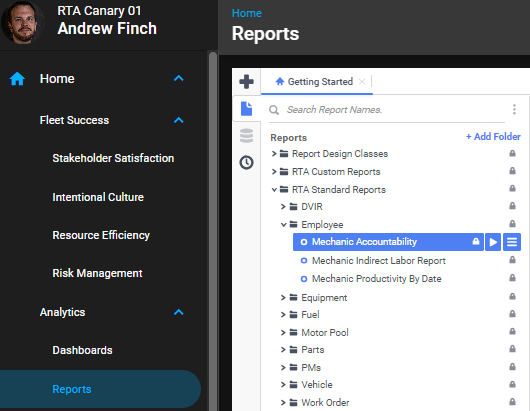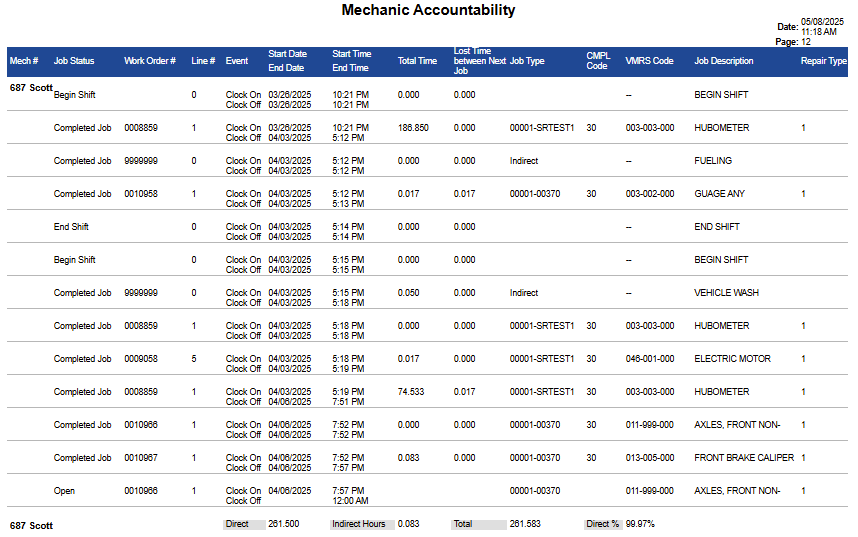Mechanic Accountability
Summary/Use Case
Report Summary
The Mechanic Accountability report provides a comprehensive record of mechanic activity, including job statuses, time spent, vehicle involvement, and job details. This report is essential for fleet managers to monitor and analyze mechanic productivity and job allocation efficiency.
*Note - Fleet360 and Classic’s Mechanic Accountability report WILL NOT match in totals but still will match in number of lines in a given time period (assuming the same time period is used)
Use Case
Track and document individual mechanic activities and job statuses
Monitor time allocation on specific job tasks to manage labor costs
Review completed job details to ensure accurate job performance records
Identify patterns in job types and frequencies to support planning and training
Support auditing processes by providing an accountability log for mechanic tasks
Location: Where to Find It
Reports > RTA Standard Reports > Employee > Mechanic Accountability
Data Filter Prompts
You will be prompted for filtering of the data to specify and narrow down the data that will be pulled. See the Data Filter List below for options.
Parameter List
Parameter Name | Value (Default) | Value (Notes) |
|---|---|---|
Show totals only? | No | If ‘No’ is selected, then then the individual job transaction will be shown in addition to the totals. If ‘Yes’ is selected, then the total Direct Labor, Indirect Labor, Total Hours, and Direct % will be displayed per mechanic. |
Data Filter List
Filter Name | Recommended Filter Condition(s) | Value (Options) | Value (Default) |
|---|---|---|---|
Facility | Equal To | 1 - 99999 | 1 |
Mechanic Number | Is Between | 0 to 999999999 | 0 to 999999999 |
Job Start Date | Is Between | Any Date Range | 1 Month Previous to Current Day |
Report Output and Data Elements
Report Output
Once the Mechanic Accountability report is run, users will see a detailed log of mechanic activities, sorted by mechanic number, job status, event, and associated time entries. The report lists job start and end times, work order numbers, vehicle numbers, and task descriptions, allowing for detailed analysis of mechanic engagement. This breakdown allows fleet managers to observe the distribution of mechanic activities, time allocation, and job details, assisting in resource management and performance evaluation.
Report Data Elements
Column Number | Column Title | Data Notes |
|---|---|---|
1 | Mech # | Mechanic identifier number |
2 | Job Status | Current status of the job (e.g., Begin Shift, Completed Job) |
3 | Work Order # | Unique identifier for the work order |
4 | LN # | Line number within the work order |
5 | Event | Event type such as "Clock On" or "Clock Off" |
6 | Date | Date of the event |
7a | Start Date | Starting date of the job or event |
7b | Start Time | Starting time of the job or event |
8a | End Date | Ending date of the job or event |
8b | End Time | Ending time of the job or event |
9 | Total Time | Total time spent on the task |
10 | Lost Time between Next Job | This is the time spent in ‘Idle’; in other words, this is when a mechanic is not clocked in to any job |
11 | Job Type | Identifier for the vehicle involved in the job |
12 | CMPL Code | Compliance code related to the job |
13 | VMRS Code | Vehicle Maintenance Reporting Standards system code |
14 | Job Description | Description of the task performed as per VMRS |
15 | Repair Type | Labor type for the task |


